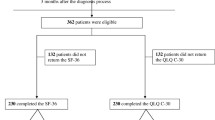Abstract
The quality of life questionnaire for cancer patients treated with anticancer drugs (QOL-ACD), which consists of four domains (functional, physical, mental, and psychosocial) and a global face scale, was developed as a generic questionnaire for Japanese cancer patients undergoing chemotherapy. We examined the validity and reliability of this questionnaire in Japanese patients with advanced non-small-cell lung cancer (NSCLC), who participated in two randomized phase III trials. After excluding two items, one showing low test–retest reliability and the other showing poor convergent validity for the target population, Cronbach's α coefficients ranged from 0.795 to 0.897 and the intra-class correlation coefficients ranged from 0.612 to 0.866. These results confirmed the high reliability of the questionnaire. The results of factor analysis provided strong support for the domain structure used in the questionnaire. Each of the four domains had a moderate to strong association with important clinical variables, such as performance status or weight loss, and correlation analysis showed that the face scale provided an appropriate measure of the global quality of life. These results indicated that the QOL-ACD is potentially useful for clinical research on Japanese patients with advanced NSCLC.
Similar content being viewed by others
References
Browman GP. Science, language, intuition, and the many meanings of quality of life. J Clin Oncol 1999; 17: 1651-1653.
Aaronson NK, Bullinger M, Ahmedzai S. A modular approach to quality-of-life assessment in cancer clinical trials. Recent Results Cancer Res 1988; 111: 231-249.
Machin D. Assessment of quality of life in clinical trials of the British Medical Research Council. J Natl Cancer Inst Monogr 1996; 20: 97-102.
Moinpour CM, Feigl P, Metch B, et al. Quality of life end points in cancer clinical trials: Reviews and recommendations. J Natl Cancer Inst 1989; 81: 485-495.
Nayfield SG, Ganz PA, Moinpour CM, et al. Report from a National Cancer Institute (USA) Workshop on quality of life assessment in cancer clinical trials. Qual Life Res 1992; 1: 203-210.
Cella DF, Tulsky DS. Quality of life in cancer: Definition, purpose, and method of measurement. Cancer Invest 1993; 11: 327-336.
Osoba D. Lessons learned from measuring health-related quality of life in oncology. J Clin Oncol 1994; 12: 608-616.
Rowland JH. Outcome assessment: Cancer-specific qualityof-life measures-beyond the research setting. Educational Book, ASCO 33rd Annual Meeting, Denver, CO, May 17-20, 1997: 342-349.
Schipper H, Clinch J, McMurray A, et al. Measuring the quality of life of cancer patients: The Functional Living Index-Cancer: Development and validation. J Clin Oncol 1984; 2: 472-483.
Aaronson NK, Ahmedzai S, Bergman B, et al. The European Organization for Research and Treatment of Cancer QLQ-C30: A quality-of-life instrument for use in international clinical trials in oncology. J Natl Cancer Inst 1993; 85: 365-376.
Cella DF, Tulsky DS, Gray G, et al. The Functional Assessment of Cancer Therapy Scale: Development and validation of the general measure. J Clin Oncol 1993; 11: 570-579.
Kobayashi K. Development of QOL questionnaires in Japan. Gan To Kagaku Ryoho 1999; 2: 472-483 (in Japanese).
Kobayashi K, Takeda F, Teramukai S, et al. A cross-validation of the European Organization for Research and Treatment of Cancer QLQ-C30 (EORTC QLQ-C30) for Japanese with lung cancer (see comments). Eur J Cancer 1998; 34: 810-815.
Fumimoto H, Kobayashi K, Chang CH, et al. Cross-cultural validation of an international questionnaire, the general measure of the Functional Assessment of Cancer Therapy (FACT-G), for Japanese. Qual Life Res 2001; 10: 201-209.
Kurihara M, Shimizu H, Tsuboi K, et al. Development of quality of life questionnaire in Japan: Quality of life assessment of cancer patients receiving chemotherapy. Psychooncology 1999; 8: 355-363.
Kaasa S, Bjordal K, Aaronson NK, et al. The EORTC Core Quality of Life Questionnaire (QLQ-C30): Validity and reliability when analyzed with patients treated with palliative radiotherapy. Eur J Cancer 1995; 31A(13/14): 2260-2263.
Masuda N, Fukuoka M, Negoro S, et al. Randomized trial comparing CDDP and CPT-11 versus CDDP and VDS versus CPT-11 alone in advanced NSCLC: A multicenter phase III study. Proc Am Soc Clin Oncol 1999; 18: 459 (abstr).
Niho S, Nagao K, Nishiwaki Y, et al. Randomized multicenter phase III trial of irinotecan (CPT-11) and cisplatin (CDDP) versus CDDP and vindesine (VDS) in patients with advanced non-small cell lung cancer (NSCLC). Proc Am Soc Clin Oncol 1999; 18: 492 (abstr).
Stewart AL, Hays RD, Ware JE Jr. The MOS short-form general health survey. Reliability and validity in a patient population. Med Care 1988; 26: 724-735.
Ware JE Jr., Sherbourne CD. The MOS 36-item short-form health survey (SF-36). I. Conceptual frameworkand item selection. Med Care 1992; 30: 473-483.
Ware JE, Harris W, Gandek B, et al. MAP-R for Windows: Multitrait/Multi-item Analysis Program-Revised User's Guide. Boston, MA: Health Assessment Lab, 1997.
SAS Institute, Inc. SAS Procedures Guide, Version 6, 3rd ed., SAS Institute, Inc. Cary, NC, 1990.
SAS Institute, Inc. SAS STAT User's Guide, Version 6, 4th ed., Vol. 1, SAS Institute, Inc. Cary, NC, 1990.
SAS Institute, Inc. SAS STAT User's Guide, Version 6, 4th ed., Vol. 2, SAS Institute, Inc. Cary, NC, 1990.
SAS Institute, Inc. SAS STAT Software: Changes and Enhancements through Release 6.12, SAS Institute, Inc. Cary, NC, 1997.
Eguchi K, Fukutani M, Kanazawa M, et al. Feasibility study on quality-of-life questionnaires for patients with advanced lung cancer. Jpn J Clin Oncol 1992; 22: 185-193.
Aaronson NK. Assessing the quality of life of patients with cancer: East meets West. Eur J Cancer 1998; 34: 767-769.
Nagata C, Ido M, Shimizu H. Choice of response scale for health measurement: comparison of 4, 5, and 7-point scales and visual analog scale. J Epidemiol 1996; 6: 192-197.
Ganz PA, Hirji K, Sim M, et al. Predicting psychosocial riskin patients with breast cancer. Med Care 1993; 31: 419-431.
Author information
Authors and Affiliations
Rights and permissions
About this article
Cite this article
Matsumoto, T., Ohashi, Y., Morita, S. et al. The quality of life questionnaire for cancer patients treated with anticancer drugs (QOL-ACD): Validity and reliability in Japanese patients with advanced non-small-cell lung cancer. Qual Life Res 11, 483–493 (2002). https://doi.org/10.1023/A:1015614505929
Issue Date:
DOI: https://doi.org/10.1023/A:1015614505929




